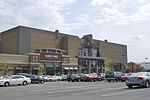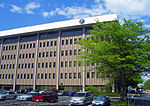Central Avenue (Albany, New York)
Streets in Albany, New YorkTransportation in Albany, New York
Central Avenue, in Albany, New York, is an 11-mile (5 km) stretch in Albany County, of the 16-mile Albany-Schenectady Turnpike, which runs from Lark Street in the city of Albany, westward through the towns of Colonie, New York and Niskayuna, New York, to the city of Schenectady, New York. In the city of Albany it is called Central Avenue, in Colonie it is known as Central Avenue or Albany Schenectady Road, and in Schenectady County (Niskayuna and Schenectady) it is called State Street. The entire route is also called Route 5.
Excerpt from the Wikipedia article Central Avenue (Albany, New York) (License: CC BY-SA 3.0, Authors).Central Avenue (Albany, New York)
Central Avenue, City of Albany
Geographical coordinates (GPS) Address Nearby Places Show on map
Geographical coordinates (GPS)
| Latitude | Longitude |
|---|---|
| N 42.699166666667 ° | E -73.811777777778 ° |
Address
Central Avenue 1277
12205 City of Albany
New York, United States
Open on Google Maps


